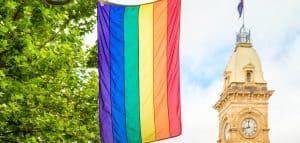
Understanding of non-binary and genderfluid people in SA is still evolving
July 14th is International Non-Binary Peoples Day.
If you’re not aware, in simple terms, a non-binary person is someone who does not identify as exclusively a man or a woman. Someone who is non-binary might feel like a mix of genders, or like they have no gender at all. Many non-binary people prefer the pronouns they/them, but if people tell you their pronouns differ, it’s important to respect them.
Varo (they/them) is the Chair of the South Australian Rainbow Advocacy Alliance (SARAA), and said they always knew they were a bit different.
“I didn’t really have the words for it until probably around 2015. Someone I was dating actually came out as genderfluid. I kinda went ‘Oh, wow, that’s an option?’”
Varo said understanding of non-binary and genderfluid people is still evolving. They reflected on the response to filling out an employee intake form at a previous job.
“It had male, female and other. And I was like, ‘I guess other is just me, right?’ So I tick the little box and expected someone to have a discussion about it,” they said.
“I got entered into the system as female and was misgendered from that point onwards basically. I spent around five years in that job being perceived as someone that I wasn’t, which had a super profound impact on my mental health.”
There are legal hurdles when people want to legally change their name and gender in South Australia too.
“To do that in South Australia, you have to have six months of counselling to change your name and gender. So I’ve been seeing a psychologist. She was like, ‘what’s the reason for your visit? I said, ‘Oh, I’d really like to change my gender legally.’ And she said, ‘okay, but you have a gender and you’ve told me your gender, so how do I treat you for that?’”
“It’s a pretty interesting little process that I think has plenty of opportunity to be more transparent and person-centered,” Varo said.
They added Non-Binary People’s Day provides an opportunity to acknowledge the stigma and discrimination that non-binary people face, and how to address it.
“A lot of my friends will message me on Facebook and be like, ‘hey, Happy Non-Binary People’s Day.’ That’s a nice moment. But in terms of tangible impact, I think we really need to as a society, look at it and say ‘what are we actually doing to help support non-binary people in our world?’“
Listen to the full interview on our health and wellbeing podcast Well Well Well here.
You can find more information about SARAA at their website.





